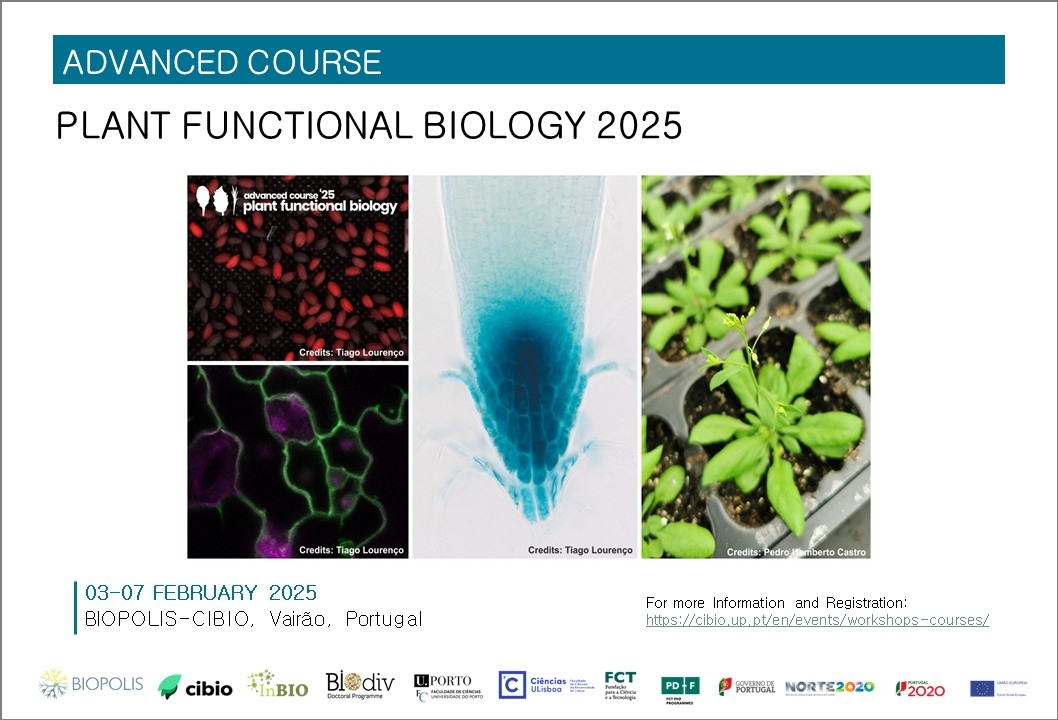Plant Functional Biology 2025
Event
Functional Biology is designed to fully decipher and understand the molecular and biochemical mechanisms underpinning biological systems. Central to this idea is the clarification of how the flux of information encoded by genes is used and regulated to maintain the life of cells and organisms under constant environmental challenges. The Plant Functional Biology course will provide an updated overview of the strategies currently deployed towards phenotype-genotype associations in multiple aspects of Plant Science research (i.e. plant development, nutrition, environmental stress, pathogen infection, specialized metabolism), and is focused on plant models, crops and omics strategies.
SELECTION CRITERIA
February 03rd, 2025
BIOPOLIS-CIBIO, Vairão, Portugal (Face-to-face and Online)

Functional Biology is designed to fully decipher and understand the molecular and biochemical mechanisms underpinning biological systems. Central to this idea is the clarification of how the flux of information encoded by genes is used and regulated to maintain the life of cells and organisms under constant environmental challenges. The Plant Functional Biology course will provide an updated overview of the strategies currently deployed towards phenotype-genotype associations in multiple aspects of Plant Science research (i.e. plant development, nutrition, environmental stress, pathogen infection, specialized metabolism), and is focused on plant models, crops and omics strategies.
The main focus of this advanced course is the study of key genes pertaining to major questions in Plant Biology, from the fundamental mechanisms to the development of new translational approaches. It is geared towards informing participants on the biological models used in cutting-edge plant research, showcasing advantages, challenges, and how to circumvent limitations. The course strongly emphasizes the current molecular tools that enhance research on gene function. We aim to highlight cutting-edge technologies, introducing concepts and strategies, but also practical components. The course will add to the previous ’24 edition by addressing new theoretical topics and bringing a completely new panel of experts, making the course attractive for previous alumni. At the practical level, the ’25 edition will focus on transcriptomic study techniques, exploring user-friendly tools and databases, RNA extraction, RNA sequencing, spatial transcriptomics and forms of data validation.
GOALS
- Understand the role of genes as key players in fundamental plant biological processes. The new edition will particularly reinforce the genes involved in plant environmental stress response and plant development.
- Gain new expertise on the most sophisticated strategies and technologies for studying gene function in plant, crop and non-canonical models.
- Obtain advanced technical know-how on genetic approaches best suited to studying genes in plants, including diverse omics (e.g. genomics, transcriptomics), genome editing, genetic engineering and plant biotechnology.
- Acquire practical experience in gene expression analysis (e.g. RNAseq, RNA extraction, data analysis and validation).
PROGRAM
Day 01 | Feb 3
Introduction to Plant Functional Biology in models and crops
09.30-09.45 Course introduction | Pedro Humberto Castro (BIOPOLIS-CIBIO, Univ. Porto)
09.45-10.30 Lecture. Arabidopsis thaliana as a genetic model | Pedro Humberto Castro (BIOPOLIS-CIBIO, Univ. Porto)
10.30-11.00 Coffee Break
11.00-13.00 Lecture. Functional strategies for crops and non-model species | Herlander Azevedo (BIOPOLIS-CIBIO, FCUP, Univ. Porto)
14.30-17.30 Practical-TP – Online tools and databases to explore gene expression in plant species
Day 02 | Feb 4
Plant development from models to crops
10.00-11.00 Lecture. Invited speaker 1 | Sílvia Coimbra (LAQV REQUIMTE, FCUP, Univ. Porto)
11.00-11.30 Coffee Break
11.30-12.30 Lecture. Invited speaker 2 | Célia Miguel (FCUL, Univ. Lisboa)
12.30-13.00 Short talks | Two selected participants
14.30-17.30 Practical-TP – RNA extraction and cDNA synthesis
Day 03 | Feb 5
Omics strategies for unconventional models
10.00-11.00 Lecture. Invited speaker 3 | Ari Pekka Mähönen (Univ. Helsinki, Finland)
11.00-11.30 Coffee Break
11.30-12.30 Lecture. Invited speaker 4 | Pedro Barros (ITQB-NOVA)
12.30-13.00 Short talks | Two selected participants
14.30-17.30 Practical-TP –RNASeq and single cell transcriptomics
Day 04 | Feb 6
Plant responses to environmental stress I
10.00-11.00 Lecture. Invited speaker 5 | Christophe Maurel (IPSiM, Univ. Montpellier, France)
11.00-11.30 Coffee Break
11.30-12.30 Lecture. Invited speaker 6 | Henrique Noronha (CBMA, Univ. Minho)
12.30-13.00 Short talks | Two selected participants
14.30-17.30 Practical-TP – Library preparation, qPCR run and data analysis
Day 05 | Feb 7
Plant responses to environmental stress II
10.00-11.00 Lecture. Invited speaker 7 | Eduardo Bejarano (IHSM-LaMayora, Univ. Málaga, Spain)
11.00-11.30 Coffee Break
11.30-12.30 Lecture. Invited speaker 8 | Isabel Abreu (ITQB-NOVA)
12.30-13.00 Short talks | Two selected participants
13.00-13.30 Closure.
--
15.30-16.30 – Friday afternoon seminar SEB – Invited speaker | Eduardo Bejarano (IHSM-LaMayora, Univ. Málaga, Spain)
VENUE
Face-to-face at CIBIO’s facilities:
• CIBIO Lab12 during the afternoon for practical classes;
• CIBIO auditorium during the morning for lectures;
• CIBIO classroom (A or B) for afternoon group work and discussions
COURSE INSTRUCTORS
Coordination
Pedro Humberto Castro | BIOPOLIS-CIBIO
Instructor (s)
Ana Campilho | BIOPOLIS-CIBIO, FCUP
Sara Freitas | BIOPOLIS-CIBIO, FCUP
Tiago Lourenço | BIOPOLIS-CIBIO, FCUP
Mariana Sottomayor | BIOPOLIS-CIBIO, FCUP
Tiago Lourenço | BIOPOLIS-CIBIO, FCUP
Mariana Sottomayor | BIOPOLIS-CIBIO, FCUP
TARGET AUDIENCE
The course targets biological and agronomical sciences students.
SELECTION CRITERIA
The complete course (lectures + practical classes) will be open to a maximum number of 16 participants. Lectures have no maximum number of participants.
75% of available student slots are reserved for BIODIV students.
Priority will be given to:
• 1st year and other PhD students attending the BIODIV Doctoral Program;
• PhD students attending other courses;
• Other post-graduate students and researchers.
APPLICATION
Early bird: 10 January 2025
Late Registration: 24 January 2025
To apply, please fill out the FORM
REGISTRATION
Complete Course (on site):
110€ (students, early bird) or 140€ (students, late registration)
170€ (other participants, early bird) or 200€ (other participants, late registration)
Lectures Only (on site or by Zoom.):
40€ (students & other participants)
Participation is free of charge for BIODIV and M BGE Students & CIBIO’s TwinLabs.
BIOPOLIS/ CIBIO-InBIO members will have an additional discount of 20%.
Registration fees do not include accommodation or meals.
